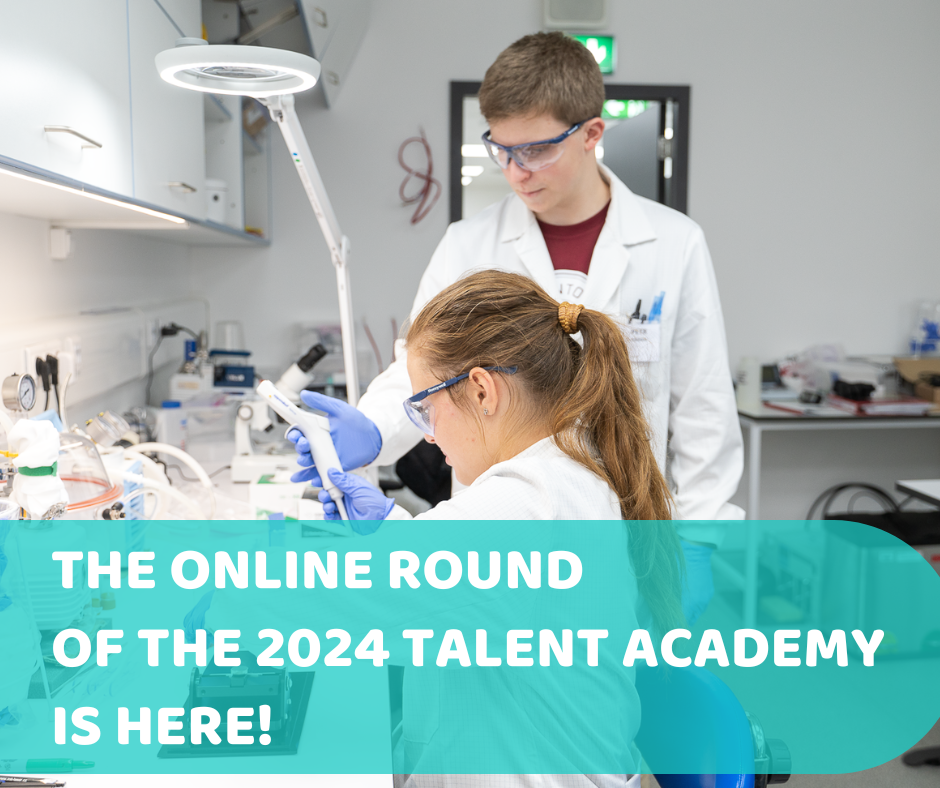For the seventh time, the ELI Beamlines and HiLASE laser centres in Dolní Břežany are opening applications for the Talent Academy, a competition for high school students who have the courage to use a laser to make further discoveries. During the autumn finals, twelve selected students will take part in a science project exploring the applications of quantum dots – miniature crystals often made up of just a few hundred atoms. Scientific teams around the world have been studying quantum dots for nearly 50 years, and were even awarded the Nobel Prize in Chemistry last year for their discovery. From the cornerstone of quantum computers to QLED displays, quantum dots have found a wide range of applications that virtually everyone has encountered.
Selection of finalists
The online round of the competition involves a short home science project focusing on the interaction of light with matter and the emission of light by the stimulated atoms. The main part of this project is a demonstration experiment that students will use to explain the physical phenomenon. The output can be either a short video or a protocol. “The purpose of the online round is not to test the participants’ theoretical knowledge, but their ability to put things into perspective and their motivation for scientific work,” says Marie Thunová, Leader of PR & Marketing at the Hilase Centre, describing the selection process for the finalists.
Topic significance
This year’s choice of topic is not entirely random. Next year will mark the 100th anniversary of quantum theory. “Thanks to the development of laser technology in recent decades, we have been able to study many quantum phenomena such as quantum entanglement or teleportation. These have already seen many applications in the form of quantum encryption, the quantum internet and quantum dots. The importance of lasers in these modern scientific and technological advances is also demonstrated by the award of the Nobel Prize in Physics in 2022, which recognised breakthroughs in quantum technology using lasers,” explains Martin Přeček, experimental researcher at the ELI Beamlines Laser Centre.
Access to modern science
Each year, ELI Beamlines and HiLASE Laser Centres choose a theme from modern science for the Talent Academy to give high school students access to the full potential of their professional laboratories and science teams. “The fact that students can synthesize and investigate quantum dots on their own during the Talent Academy is simply unique. We believe that working on contemporary scientific issues will motivate them to pursue further research activities,” says mentor Michal Vyvlečka, science popularizer.
Applications
Registration for the Talent Academy is open until 15 September 2024. Registration takes place directly on the talentovka.cz website.
Basic information:
Organisers: ELI Beamlines Facility (ELI ERIC) and HiLASE Centre (Institute of Physics of the Czech Academy of Sciences)
About Talent Academy: www.talentovka.cz, Facebook, Instagram
Illustrative photos: bit.ly/TalentovkaMedia
Applicant profile: 15–19 years old, high school student with an interest in scientific and technical subjects
The Talent Academy 2024 project n. 0023/7/NAD/2024 was supported by the Ministry of Education, Youth and Sports within the Support of talented pupils of elementary and high schools in 2024.
Talent Academy 2024 schedule
- 31. 5. – 15. 9. 2024 / Sign up (online round)
- 15. 9. 2024 / Deadline for online projects
- 7. 10. 2024 / Result evaluation
- 2.– 4. 11. 2024 / Final round in the Dolní Břežany laser centres
Media contacts
ELI Beamlines Facility: Hana Strnadová | Hana.Strnadova@eli-beams.eu | +420 601 560 333
HiLASE Centre: Radka Kozáková | Radka.Kozakova@hilase.cz | +420 601 560 164
About the organisers
ELI Beamlines Facility is a laser user centre focused on fundamental research. Since 2023, it is part of the international scientific consortium The Extreme Light Infrastructure ERIC (ELI ERIC). The ELI Beamlines Facility has four ultra-intense laser systems that work in synergy with each other and, thanks to their high peak powers, open up the possibility for scientific teams from all over the world to perform completely new types of experiments. For example, these lasers make it possible to study how matter behaves under extreme conditions, to simulate the environment inside large planets right in the laboratory, or to accelerate particles without having to build huge accelerators.
HiLASE Centre is a scientific research centre of the Institute of Physics of the CAS, which focuses on the experimental development of a new generation of diode-pumped lasers with high pulse energy and high repetition rate. The centre also tests the durability of optical materials and conducts research on shock wave material surface hardening, precision cutting, drilling, welding, micromachining and surface cleaning. Its ambition is to be the R&D partner of first choice for companies and research organisations looking for innovative laser technologies and solutions, both on Earth and beyond.








